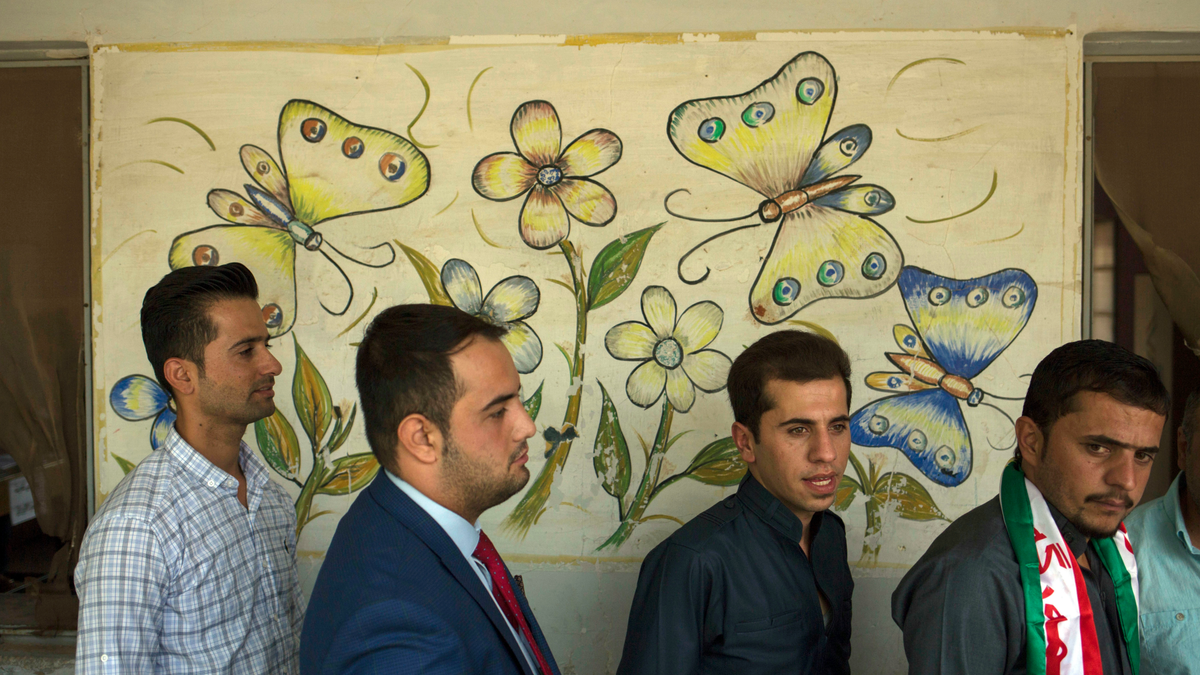
IRBIL, Iraq – The Kurdish independence referendum in Iraq, while non-binding, is a symbolic milestone in the Kurds' decades-long struggle to achieve statehood.
The Kurds are among the largest stateless ethnic groups in the world, with some 30 million concentrated in an area straddling Turkey, Iraq, Iran, and Syria. A minority in all four countries, the Kurds speak their own language, with several dialects. Most are Sunni Muslims.
Denied their own state when colonial powers drew the map of the modern Middle East after the fall of the Ottoman Empire, the Kurds have long pushed for autonomy or outright independence in all four countries, and have often been brutally repressed.
All four countries, along with the United States and virtually the entire international community, are opposed to the referendum, making formal independence unlikely. But the vote has deep symbolic significance for the region's Kurds, and could lead to further unrest.
TURKEY
Nearly half of the region's Kurds live in Turkey, where they endured decades of marginalization and discrimination, only gaining the right to speak the Kurdish language in the 1990s.
The Turkish state quashed several Kurdish rebellions in the early years of the republic, after the collapse of the Ottoman Empire. More recently, the Kurdistan Worker's Party, or PKK, has been waging a three-decade insurgency. The fighting has claimed tens of thousands of lives since 1984.
Since coming to power in 2002, President Recep Tayyip Erdogan's government has carried out reforms that have improved the minority group's rights and even initiated peace talks with the PKK. But the fragile peace-process collapsed in 2015, reigniting the bloody conflict in Turkey's predominantly Kurdish southeast region.
About a dozen legislators from Turkey's pro-Kurdish political party, accused of being the political wing of the PKK, have been jailed on terror-related charges. The party denies links to the PKK, which is considered a terrorist group by Turkey and its Western allies.
___
IRAQ
In Iraq, the Kurds repeatedly rose up against the central government throughout the 20th century. In the 1980s, they sided with Iran against Saddam Hussein's government in the Iran-Iraq war. To punish them, Saddam launched a scorched-earth campaign and chemical attacks, which together killed an estimated 50,000 people.
The U.S. imposed a no-fly zone after the 1990 Gulf war that granted the Kurds de facto autonomy in northern Iraq and made them a close American ally. The Kurds formalized their autonomy after the U.S.-led invasion that toppled Saddam, and the Kurdish region emerged as a rare success story, largely spared from the violence plaguing the rest of the country.
The Kurdish self-rule zone officially makes up about 10 percent of Iraq's territory, with a population of about 3 million, around 8 percent of Iraq's total 37 million.
Oil exports fueled an economic boom in the Kurdish region, leading to talk of a new Dubai in the heart of a troubled Middle East. But those hopes were largely dashed in 2014, when oil prices plunged and the Islamic State group swept across northern Iraq, drawing to within miles (kilometers) of the Kurdish regional capital, Irbil.
The U.S. and its allies rushed aid to Kurdish forces, known as the peshmerga, who were eventually able to push the extremists back with the help of coalition airstrikes. In the process, however, they seized large areas outside their autonomous zone, escalating long-running territorial disputes with the central government. The Kurds and Baghdad have also been at odds over the sharing of oil revenues.
___
SYRIA
Syria's Kurds, who make up 10 percent of the country's population, were only granted the right to citizenship in 2011, when President Bashar Assad sought to win them over in the early days of the uprising against him.
The main Syrian Kurdish party, known as the PYD, has benefited from a tacit non-aggression pact with Assad since the early months of the war, when the Syrian army withdrew from much of northeastern Syria to battle rebels elsewhere in the country, allowing the Kurds to carve out a zone of autonomy.
The PYD's armed wing, known as the YPG, later expanded that enclave by battling the Islamic State group with the aid of U.S. airstrikes. They are now the main component of the U.S.-backed Syrian Democratic Forces, which has driven IS from much of northern Syria and is now battling the extremists in their de facto capital, Raqqa.
Turkey views the YPG as an extension of the PKK, and sent troops into Syria a year ago to battle the Islamic State group and to stem the Kurds' advance. Turkish President Recep Tayyip Erdogan on Monday warned of a similar intervention in response to the referendum in Iraq, saying "We could arrive suddenly one night."
___
IRAN
Kurds represent about 10 percent of Iran's population of 80 million people, with many living in the mountainous northwest that borders Iraq and Turkey.
A breakaway Kurdish republic backed by the Soviets briefly emerged in the Mahabad region after World War II, and an uprising broke out there in the years after Iran's 1979 Islamic Revolution. A guerrilla campaign by the Democratic Party of Iranian Kurdistan, or PDKI, continued for several years, until the group declared a unilateral cease-fire in 1996.
The death of a Kurdish maid at a hotel in Mahabad in May 2015 sparked unrest, as opposition groups alleged Iranian security forces had a hand in it. Protests also erupted in Baneh this year when Iranian forces killed two Kurdish men.
